As loving pet parents, we always want to share our lives, and sometimes our meals, with our furry companions. However, what tastes delicious and is perfectly safe for humans can often be toxic or even deadly for dogs. Their digestive systems and metabolisms are vastly different from ours, making many common household foods dangerous. In fact, pet poisonings are a significant concern, with hundreds of thousands occurring annually in the United States, and human foods are a major contributor. To ensure your canine friend’s safety and health, it’s crucial to understand what shouldn’t you feed your dog. This guide aims to equip you with essential knowledge about foods to strictly avoid and those that are perfectly safe, acting as your comprehensive “cheat sheet” to protect your beloved pet.
Why Certain Foods Are Toxic to Dogs
Understanding why some foods are harmful to dogs is key to preventing accidental poisonings. Canine digestion and metabolism operate differently from humans, meaning substances that we can safely process might accumulate to toxic levels in their bodies.
For instance, theobromine and caffeine, found in chocolate, are metabolized much slower by dogs. This slower processing allows these substances to build up rapidly in their system, potentially leading to fatal consequences. While humans can easily digest cherries, the cyanide present in their pits, stems, and leaves can be problematic for dogs if consumed in large quantities. Additionally, cherry pits are difficult for dogs to digest and can cause digestive upset like diarrhea. Therefore, it’s best to avoid giving them cherries entirely.
The severity of food toxicity can also vary depending on a dog’s size, breed, and existing health conditions. A small amount of a toxic food might have a more pronounced effect on a smaller dog compared to a larger one. Always consult your veterinarian if you have any questions or concerns about specific foods and your dog’s health.
List of Common Foods Dogs Cannot Eat
Many everyday household foods pose a significant risk to dogs, with some being highly toxic. While this list is extensive, it is not all-inclusive, so always exercise caution. Common culprits include alcohol, avocados, macadamia nuts, grapes and raisins, xylitol, and chocolate.
1. Alcohol
Due to their smaller size, dogs and cats are far more susceptible to the deadly effects of alcohol than humans. Even minimal amounts can cause severe harm, with smaller pets facing greater danger from even tiny ingestions. Symptoms of alcohol poisoning in dogs mirror those in humans, including vomiting, breathing difficulties, coma, and even death.
2. Apple, Apricot, Cherry, and Plum Seeds/Pits
While the fleshy parts of apples are generally safe for dogs, the core and seeds are not. Apple seeds contain cyanide, and though small amounts may not be immediately harmful, it’s safest to avoid them altogether. Similarly, apricot, cherry, peach, and plum seeds and pits should be strictly avoided. These fruit pits also contain cyanide, which can lead to vomiting, an irregular and fast heartbeat, seizures, coma, and even death, by preventing red blood cells from effectively carrying oxygen.
3. Avocado
Avocados are not a suitable food choice for dogs. Historically, cases of myocardial damage have been reported in dogs after avocado consumption. Although this specific outcome hasn’t been widely replicated, avocados are known to cause issues in other mammal species. Furthermore, an intact avocado pit poses a significant risk of obstructing a dog’s gastrointestinal tract. It’s best to keep this fruit away from your canine companion.
4. Broccoli
Broccoli contains isothiocyanates, which can be harmful to pets in very large doses. While tiny amounts of broccoli might be occasionally tolerated, it’s generally advisable to avoid it, especially since there are so many other healthier and safer vegetable options available. Broccoli stalks can also present a choking hazard or cause an obstruction in a dog’s throat.
5. Caffeine and Coffee Grounds
Caffeine contains methylxanthines, which can cause potentially fatal symptoms in dogs, including diarrhea, vomiting, seizures, and an irregular heartbeat. If your dog accidentally consumes coffee grounds or any highly caffeinated drink, their heart rate may dangerously accelerate. This can lead to tremors, arrhythmia, breathing difficulties, and other severe symptoms.
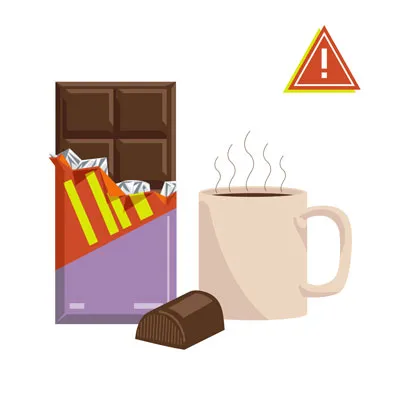 Dark chocolate bar with small pieces scattered around
Dark chocolate bar with small pieces scattered around
6. Chicken and Turkey Skin, Ham, and Other Fatty Cuts of Meat
Fatty cuts of meat, such as ham, chicken skin, and turkey skin, should be discarded rather than given to pets as treats. Their high-fat content can trigger acute pancreatitis, a severe and potentially life-threatening illness with serious complications.
You should also avoid giving your dog turkey and chicken bones. These bones can splinter, leading to obstructions in the bowels or causing damage to the stomach or intestines. In severe cases, a punctured stomach or intestines can result in a fatal abdominal infection. For more information on preventing such incidents, you can learn about what is the one meat dogs should not eat.
7. Chocolate
Chocolate toxicity is a frequent cause of pet poisoning. Dogs absolutely cannot eat any chocolate product. Chocolate contains theobromine, a lethal component, with darker chocolates having higher concentrations. Chocolate also contains caffeine, and some sugar-free varieties may include xylitol, which is highly toxic to dogs. Dogs and cats cannot metabolize chocolate effectively. Dark chocolate and baker’s chocolate are the most dangerous, but any type of chocolate can cause problems. Symptoms of chocolate ingestion include hyperactivity, vomiting, diarrhea, pancreatitis, abnormal heart rhythm, and seizures. If your dog ingests any amount of chocolate, no matter how small, contact your veterinarian immediately.
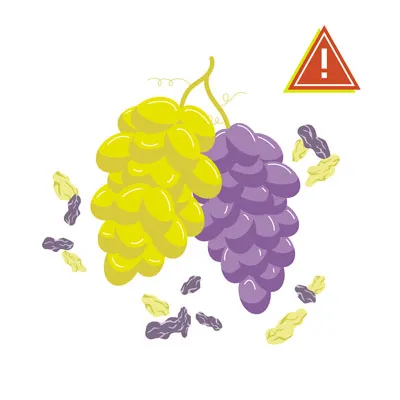 Bowl of fresh green and purple grapes
Bowl of fresh green and purple grapes
8. Grapes and Raisins
Grapes and raisins are exceptionally dangerous for dogs. These fruits can lead to severe health issues, including kidney failure, because their tartaric acid is toxic to canine kidneys. Even a few bites can cause significant harm. Symptoms of grape or raisin poisoning include vomiting, diarrhea, loss of appetite, changes in urine output, or complete absence of urination.
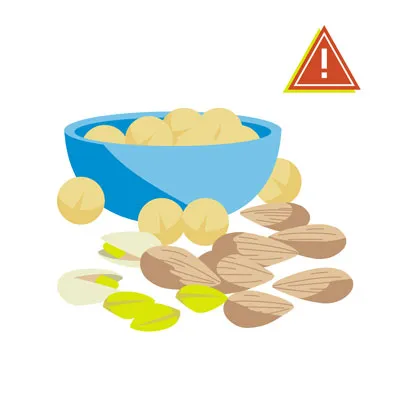 Group of shelled macadamia nuts
Group of shelled macadamia nuts
9. Macadamia Nuts, Almonds, and Pistachios
Macadamia nuts can cause dogs to suffer from painful symptoms such as weakness, overheating, and vomiting. While the exact mechanism of toxicity remains somewhat mysterious, these nuts are considered highly toxic to dogs. As few as six nuts can induce severe poisoning in a small dog. Other nuts, while not always as toxic as macadamias, can pose choking hazards or become problematic if they are flavored or spiced. For example, pistachios and almonds can be choking hazards.
10. Milk and Dairy Products
Milk and other dairy products should be given with extreme caution, on a case-by-case basis. Some dogs can tolerate milk or dairy without issues, but many are lactose intolerant or allergic, experiencing diarrhea and gas if they consume cow’s milk. Ice cream is also unhealthy for dogs due to its high sugar and fat content. Instead, offer frozen bites of healthy fruits that your dog can safely eat. Small quantities of lower-fat cheese can be acceptable as an occasional treat, but avoid high-fat varieties.
11. Mushrooms
It is always safest to err on the side of caution and avoid feeding your dog any mushrooms. Mushrooms contain various toxins that can cause kidney and liver failure, vomiting, diarrhea, hallucinations, and damage to red blood cells. While washed, white mushrooms from a grocery store might be okay, it is probably safer to choose a different treat to eliminate any risk.
12. Nutmeg and Cinnamon
Dogs should never be fed foods containing nutmeg. This spice can induce hallucinations and severe vomiting due to the compound myristicin. Its effects are more pronounced with high doses or in smaller dogs. If your dog ingests any amount of nutmeg, contact your veterinarian immediately. Cinnamon should also be avoided, not primarily due to toxicity, but because it can irritate your dog’s mouth and potentially lead to low blood sugar, which can have serious health implications.
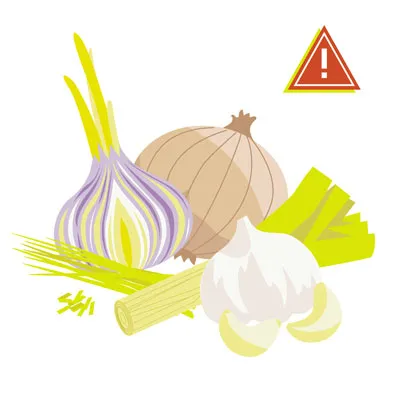 Assortment of fresh onions and garlic cloves
Assortment of fresh onions and garlic cloves
13. Onions, Garlic, Chives, and Leeks
Many pet owners are surprised to learn that herbs from the allium family, including onions, garlic, chives, and leeks, are unsafe for dogs. These plants contain sulfoxides and disulfides, which can damage red blood cells and cause anemia in both dogs and cats. Onion and garlic powders are present in many prepared foods, even baby food, so always read labels carefully before offering store-bought items to your pet. All allium plants can cause potentially fatal anemia in dogs and cats. Certain Japanese breeds, such as Akitas and Shiba Inus, are particularly sensitive, but these plants are dangerous for all dogs.
14. Salt
Excessive salt intake can disrupt the fluid balance in your dog’s cells, leading to tremors, seizures, diarrhea, or even a coma. Whether it’s rock salt, homemade play dough, or potato chips, resist your dog’s pleas to protect their health from excessive sodium.
15. Spicy Food
Keep your dog away from spicy foods. Hot, spicy ingredients can cause vomiting, stomach ulcers, or diarrhea, leading to considerable discomfort for your dog and potentially costly emergency vet visits.
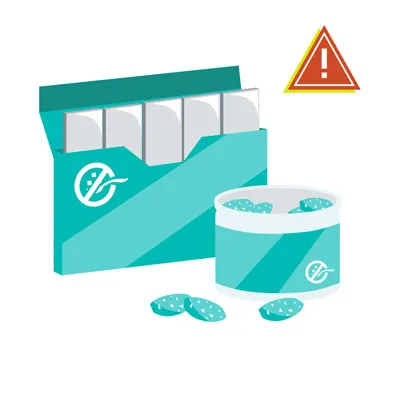 Sugar-free gum packs and loose pieces
Sugar-free gum packs and loose pieces
16. Sugar-Free Gum and Candy (Xylitol)
Xylitol is an artificial sweetener found in many human foods, especially sugar-free gum, candy, and baked goods. In dogs, xylitol can cause a rapid and dangerous drop in blood sugar, leading to weakness and seizures. Some dogs may also develop liver failure. Cases of xylitol poisoning in dogs are on the rise; the amount of xylitol in just five pieces of gum could be fatal to a 65-pound dog.
17. Tomatoes and Raw Potatoes
Tomatoes and potatoes fall into a category of foods that are “safe in some forms, unsafe in others.” A ripened red tomato is generally safe for dogs. However, the green parts of the tomato plant, and green, unripe tomatoes, contain solanine, which is toxic to dogs. Potatoes follow a similar pattern: if baked or boiled without additives, they are generally safe in small amounts. However, raw potatoes also contain solanine and are toxic to dogs.
18. Tobacco
Tobacco is extremely dangerous and unhealthy for your dog. Exposure to nicotine-containing products can cause a range of symptoms, including vomiting, diarrhea, rapid or labored breathing, agitation, abnormal heart rate, wobbliness, muscle weakness, high or low blood pressure, seizures, and tremors. More significant or frequent exposure can lead to blue gums and coma, potentially becoming fatal. Dogs are naturally curious and may encounter discarded cigarettes or cigarette butts. If your dog gets into tobacco, immediate veterinary attention is crucial.
19. Yeast and Raw Dough
Yeast and raw dough are unsafe for dogs for several critical reasons. Raw dough can expand significantly in a dog’s stomach, causing severe pain and potentially life-threatening conditions like gastric torsion or rupture. Furthermore, the yeast and sugar in raw dough can ferment, producing alcohol and leading to alcohol toxicity. This situation can quickly become fatal and requires immediate medical intervention.
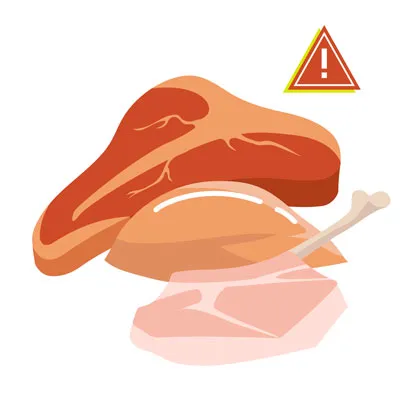 Pieces of raw red meat on a cutting board
Pieces of raw red meat on a cutting board
20. Raw Meat
Never feed your dog raw or undercooked meat. Raw meat can harbor dangerous bacteria such as Salmonella or E. coli, which can be harmful to dogs just as they are to humans. Additionally, bones present in raw meat pose a significant choking hazard.
21. Rhubarb
Rhubarb, often used in desserts, is not safe for pets. Its leaves contain soluble calcium oxalate crystals. Consumed in large enough quantities, these crystals can bind with calcium in the dog’s body, causing a dangerous drop in calcium levels and potentially leading to renal failure. Symptoms include tremors, weakness, drooling, bloody urine, changes in thirst and urination, and vomiting.
22. Star Fruit
Similar to rhubarb, star fruit also contains soluble calcium oxalate crystals. For your dog’s safety, do not allow them to snack on this fruit.
23. Flavored and Seltzer Water
Always opt for fresh, clean water for your dog over anything flavored or carbonated. Seltzer and flavored waters may contain added ingredients that are dangerous for pups, such as sugar or salt. While plain seltzer water might be acceptable in small amounts if urgently needed, it can still cause gas and bloating. Sticking to plain water is always the safest choice for your pet.
13 Foods Safe for Dogs
While the list of foods your dog cannot eat is extensive, many human foods are perfectly safe and can even be healthy additions to their diet. Some of the most popular and safest options include dehydrated chicken or beef (in very small quantities), apples (without the core), green beans, and carrots.
Here are some common foods that your dog can enjoy in moderation. This list is not exhaustive but provides a great starting point for safe treats. You can also explore what is good for dogs to eat with upset stomach for specific dietary needs.
1. Apples, Oranges, and Bananas
Remember to avoid apple cores and seeds due to their toxicity. However, the fleshy parts of apples, without seeds, are perfectly fine for your dogs. Cut apples into small pieces to eliminate any risk of your dog ingesting the core. Oranges are safe when fed in small amounts. Bananas, when given in moderation and peeled, can also be a delightful and healthy treat.
2. Blueberries and Blackberries
Blueberries are delicious treats that most dogs love. They are packed with antioxidants, fiber, phytochemicals, and vitamin C, all of which contribute to your pup’s overall health. Blackberries are also generally safe in moderation.
3. Cantaloupe, Mango, Peaches, Pears, Pineapples, and Watermelons
Many fruits can be safely enjoyed by your dog, so feel free to experiment and discover their favorites! Cantaloupe is an excellent choice to start with. Your dog might also enjoy watermelon, provided you remove all rinds and seeds (including the pale seeds in seedless varieties) to prevent choking. Given its high water content, watermelon is especially refreshing on a warm day. Mangoes, peaches, pears, and pineapples are also safe in moderation; just ensure you remove all seeds, pits, and cores before offering these fruity treats.
4. Carrots, Cucumber, and Celery
Looking for more healthy options? Remember the three C’s: carrots, cucumbers, and celery. These vegetables and fruits are particularly good choices for overweight dogs due to their low-calorie content. Bite-sized carrot pieces offer a satisfying crunch that many dogs adore. Celery bites also provide a fun crunch and can even help with bad breath. Cucumber slices are rich in vitamins and minerals while being very low in carbohydrates and fats.
5. Cheese
While it’s generally best for dogs to avoid milk and most dairy products, a small amount of cheese given occasionally is usually acceptable, provided your dog is not lactose intolerant. Be mindful that some cheeses are high in fat, which can be dangerous for dogs. Opt for lower-fat varieties, like a small piece of mozzarella, or consult your veterinarian for the best type of cheese to offer.
6. Eggs
Fully cooked eggs make a tasty and nutritious treat for your dog. Scrambled eggs, in particular, can be soothing for an upset stomach and provide an excellent source of protein. For specific concerns about digestive health, you might consider learning more about what can dogs eat with an upset stomach.
7. Peanuts, Peanut Butter, and Cashews
Peanuts and cashews are safe for dogs when given in small quantities. However, due to their high-fat content, these should only be occasional treats. Ensure they are unsalted, unflavored, and unseasoned. As for peanut butter, in moderation, it’s a delicious and protein-rich treat. Always look for unsalted peanut butter and strictly avoid any sugar-free varieties that contain xylitol.
8. Popcorn and Corn
Popcorn is another enjoyable treat for many dogs. Choose air-popped, unsalted, and unbuttered popcorn. Carefully inspect the popcorn to ensure there are no unpopped kernels, which could pose a choking hazard. Similarly, corn (removed from the cob) is acceptable when served plain, without butter, salt, or spices.
9. Coconut and Honey
In small amounts, coconut is generally fine for your dog, including coconut milk and coconut oil. It contains lauric acid and may even help with allergies. However, some dogs might experience an upset stomach from fresh coconut or coconut milk, so introduce it cautiously. Avoid coconut water, as it is not safe for dogs. Also, never let your dog chew on the furry shell, which could cause choking. Honey, in moderation, is also safe and provides numerous vitamins and minerals beneficial for your pup.
10. Shrimp and Fish
Plain, fully cooked shrimp is a great choice for your dog. Remember to remove the shell, head, tail, and legs, and avoid any seasoned, salted, or buttered varieties. Fish, especially salmon and sardines, is also permissible. Ensure the fish is plain, fully cooked, and boneless. A good general rule is to offer fish no more than twice a week. Plain, canned tuna, packed in water (not oil), is safe in moderation to avoid excessive mercury and salt.
11. Turkey
Turkey meat, when prepared correctly, is a healthy and safe source of protein for dogs. Always remove the skin, fat, and bones before offering small, plain bites as a delicious treat. Avoid any seasoned or salted turkey.
12. Grains, Wheat, and Quinoa
What about grains, wheat, or quinoa? Just like corn, a small amount of wheat or other grains is perfectly fine for dogs. Quinoa is often considered a healthier filler option. Always monitor your dog for any signs of allergic reactions when introducing new grains.
13. Green Beans
Many dogs absolutely love green beans, whether served raw, steamed, or from a can. They are safe, tasty, and healthy—a winning combination. Choose raw or plain-cooked green beans without added spices, oils, or salt. Cut them into small, bite-sized pieces to prevent choking.
What Dogs Are Most at Risk if They Consume Toxic Foods?
While it’s crucial to prevent any dog from ingesting toxic foods, certain dogs face higher risks.
- Small breeds vs. large breeds: Smaller dogs are more vulnerable to toxic substances due to their lower body weight, especially with items like chocolate, where the dose per body weight becomes critical.
- Puppies: Younger dogs have less developed digestive and immune systems, making them more susceptible to certain substances, including potential pathogens in raw dog food.
- Elderly dogs: Older dogs may be at higher risk due to existing health conditions that can compromise their ability to process toxins or recover from illness.
- Dogs with pre-existing conditions: Dogs with underlying health issues, such as diabetes or kidney disease, are often at greater risk if they consume toxic foods.
How to Prevent Dogs from Eating Toxic Foods
Accidents can happen, but proactive measures can significantly minimize the risk of your beloved pup getting into unsafe human food.
1. Store Foods Out of Reach
Ensure that all toxic foods are inaccessible to your dog. Keep dangerous items on high shelves, securely locked away in cabinets that your pup cannot open or reach.
2. Avoid Feeding Dogs from Your Plate
Resist the urge to feed your dog from your plate or while you are cooking in the kitchen, even if it’s just a small treat. The safest practice is to only offer treats specifically formulated for dogs.
3. Educate Family Members and Guests
Inform all family members, including children, and any guests about the importance of not sneaking food to your dog, no matter how tempting their pleading eyes may be. Consistency is key in preventing accidental ingestions.
4. Be Careful During Holidays
Exercise extra caution during holidays. The busy atmosphere and abundance of food can make it easy to let your guard down. Be vigilant while cooking and entertaining. If, despite your precautions, your dog consumes something toxic, being prepared can allow you to act quickly. Keep emergency contact information readily available for 24/7 veterinary services, including during holidays, and for poison control centers.
What to Do if Your Dog Eats Something Toxic
If your dog consumes toxic food, obtaining help as quickly as possible is paramount. Familiarize yourself with the common symptoms of food toxicity so you can promptly recognize if your dog has ingested something harmful. Symptoms vary depending on the substance but can include listlessness, distress, pain, vomiting, bloody stools, or a bloated stomach that feels hard to the touch. A severely bloated stomach can indicate a life-threatening condition that requires immediate treatment.
If you observe these symptoms, take the following steps:
- Call your veterinarian or poison control immediately. Time is of the essence; treatments are generally more successful, and hospitalization periods shorter when a dog receives prompt medical attention.
- Be prepared with crucial information. This includes the type of food eaten, the estimated amount consumed, and the time of ingestion.
- Avoid home remedies unless directed by your veterinarian. Remedies can vary significantly depending on the ingested substance, and even inducing vomiting can be harmful in certain situations.
Dog Care Story Can Help You Keep Your Dog Healthy
From household toxins to dangerous foods, it can be challenging to keep track of everything your dog shouldn’t get into. Dogs don’t always have the most discerning taste, but by following this comprehensive guide and remaining vigilant, you can significantly help protect your dog from harmful foods.
The good news is that there are numerous foods that are safe and healthy for your dog to enjoy! Discover which safe foods from our list your dog loves, and offer them as rewarding treats. If you are ever unsure about any food item, always consult with your veterinarian.
